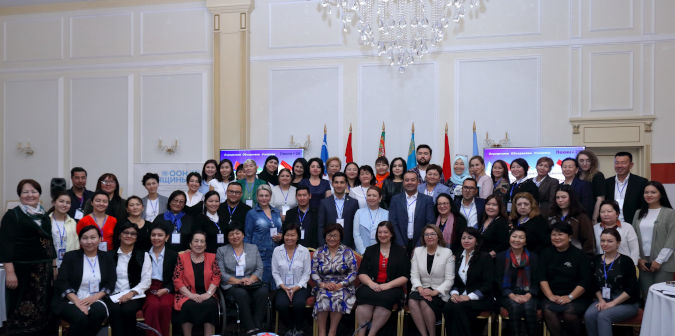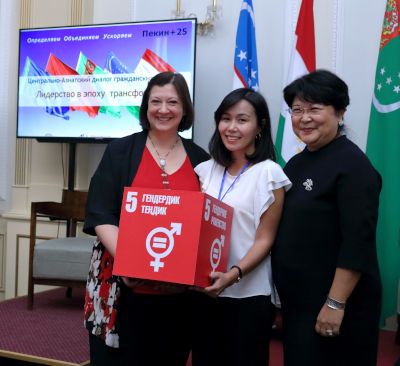Kyrgyzstan hosts civil activists from across Central Asia for a landmark dialogue on gender equality
Date:

Activists participate in the second Beijing+25 sub-regional consultation for Europe and Central Asian countries in a bid to accelerate gender equality.
Bishkek, September 19, 2019 – Civil activists from across Central Asia joined high-level guests in Kyrgyzstan for a two-day dialogue to review results and constraints to gender equality over the past 25 years and to identify new opportunities in today’s rapidly changing world.
This event was the second in a series of Beijing+25 sub-regional consultations ahead of Geneva regional consultation from October 28 to 29. The participants included Roza Otunbayeva, the former President of Kyrgyzstan, Altynai Omurbekova, Vice Prime-Minister of Kyrgyzstan, UN Women representatives and over 50 government officials, civil activists and youth from five Central Asian countries.
Altynai Omurbekova, Vice Prime-Minister of the Kyrgyz Republic, pointed to some critical challenges for the Central Asian region, which also reflect the global picture. According to country Vice Prime-Minister, the problem of religious extremism exists, and often young people and women become the victims of radicalization.
“Today’s dialogue of civil activists is a unique platform for joint critical discussion of the current status in the countries of the region and gender equality. For 25 years, the Kyrgyz civil society was at the forefront and driver of progress and change that we witness today. The progressive legislation of Kyrgyzstan in the field of gender equality is the proof of those changes,” noted Altynai Omurbekova.
Roza Otunbayeva, the former Kyrgyz President, noted that the 25 years which have passed since the Beijing Declaration was adopted, can be characterized as difficult and problematic. There are still many unsolved issues in gender equality sphere and violence is still widespread.
“Violence against women and girls is the trouble of our region that raises concerns of the international community. Women and girls’ issues were not on the agenda 25 years ago. Ala kachuu (bride kidnapping) still exists in the society although it’s a crime,” noted Ms. Otunbayeva.

Alia El-Yassir, the UN Women Regional Director for Europe and Central Asia, stressed the importance of young peoples’ voices being heard so that they can help shape the future they want.
“We need to make sure that the voices of women and girls who continue to experience different forms of exclusion and discrimination are heard. Let’s think about what it means to leave no women or girl behind in Central Asia. It is critical to use this moment to bring together the gender equality advocates and visionaries who were instrumental in creating the Beijing Platform for Action more than two decades ago together with the next generation of women’s rights activists,” stated Alia El-Yassir.
Ulziisuren Jamsran, the UN Women Country Office Representative, spoke about the foundations for gender equality and emphasized that “on the basis of such documents like the Convention on the Elimination of all Forms of Discrimination Against Women (CEDAW), execution of country Action Plan, we clearly see those areas that enable us to move forward as well as constrains and factors. We need to implement the work on studying and transforming these constrains into supporting gender equality”.
Zere’s speech, a Kyrgyz singer, was an event highlight. The young artist, who spotlights critical social problems in her work, spoke about the mixed reactions she gets – from threats to support. “By means of music and symbolism, we would like to inspire to the young generation to solve existing problems together, otherwise we will not be able to sort out more serious and global challenges in the future,” said the singer.
The year 2020 will be marked by the 25th anniversary of the fourth World Conference on women empowerment and adoption of Beijing Declaration and Platform for Action, as well as by the five years since the adoption of the Global Agenda on sustainable development 2030 (SDG Agenda 2030).